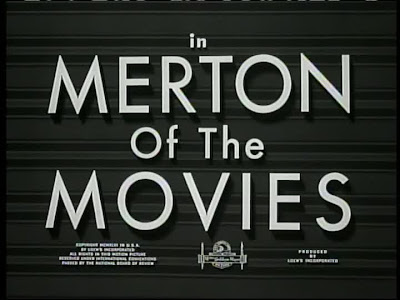Merton of the Movies

Merton of the Movies (Robert Alton, MGM) is a perfect companion piece to The Perils of Pauline. I wrote of that film that it is "neither a remake of the silent serials nor a biopic about the star Pearl White, but rather a backstage melodrama that purports to do both." Similarly, Merton of the Movies creates a slapstick comedy out of an aspiring dramatic actor for the silent screen (Red Skelton in the title role) being cast in a satirical slapstick comedy, unbeknownst to him.
The film opens with a typically 1947 documentary montage about Hollywood, with voiceover narration.

There is a Vorkapich-like self-reflexive montage in the middle, too.

To all but the most nostalgic of fans, I suspect, much of Red Skelton's comedy comes across as a dated variant of rube-goes-to-the-city schtick. What is more interesting in the film is the way the film's reflexivity reinforces his star performance, so that the misrecognition he has of the world (and of what "acting" is) becomes the basis that movie producers use for their comedy.

In the process, the film plays with the history of silent film, both real, as in this reference to films like The Black Hand (1906)...
 and apocryphal, as when Merton thinks he's going to be run over by a train.
and apocryphal, as when Merton thinks he's going to be run over by a train.
 It's a mainstay of ideological criticism to say that movies reconcile contradictions, and it's hard for me not to read this film as speaking to a recently urbanized America, who find themselves as on the other side of the changes of modernity and dislocation and therefore like to look back to a simpler time and a more sincere culture. There are similar ideological tensions later (c.f. Jim Collins' reading of the "new sincerity" in 1990s culture), but the 1940s strikes me as the last decade in which the small-town rube can function as a sympathetic figure.
It's a mainstay of ideological criticism to say that movies reconcile contradictions, and it's hard for me not to read this film as speaking to a recently urbanized America, who find themselves as on the other side of the changes of modernity and dislocation and therefore like to look back to a simpler time and a more sincere culture. There are similar ideological tensions later (c.f. Jim Collins' reading of the "new sincerity" in 1990s culture), but the 1940s strikes me as the last decade in which the small-town rube can function as a sympathetic figure.

There is a Vorkapich-like self-reflexive montage in the middle, too.

To all but the most nostalgic of fans, I suspect, much of Red Skelton's comedy comes across as a dated variant of rube-goes-to-the-city schtick. What is more interesting in the film is the way the film's reflexivity reinforces his star performance, so that the misrecognition he has of the world (and of what "acting" is) becomes the basis that movie producers use for their comedy.

In the process, the film plays with the history of silent film, both real, as in this reference to films like The Black Hand (1906)...
 and apocryphal, as when Merton thinks he's going to be run over by a train.
and apocryphal, as when Merton thinks he's going to be run over by a train.  It's a mainstay of ideological criticism to say that movies reconcile contradictions, and it's hard for me not to read this film as speaking to a recently urbanized America, who find themselves as on the other side of the changes of modernity and dislocation and therefore like to look back to a simpler time and a more sincere culture. There are similar ideological tensions later (c.f. Jim Collins' reading of the "new sincerity" in 1990s culture), but the 1940s strikes me as the last decade in which the small-town rube can function as a sympathetic figure.
It's a mainstay of ideological criticism to say that movies reconcile contradictions, and it's hard for me not to read this film as speaking to a recently urbanized America, who find themselves as on the other side of the changes of modernity and dislocation and therefore like to look back to a simpler time and a more sincere culture. There are similar ideological tensions later (c.f. Jim Collins' reading of the "new sincerity" in 1990s culture), but the 1940s strikes me as the last decade in which the small-town rube can function as a sympathetic figure.
Comments